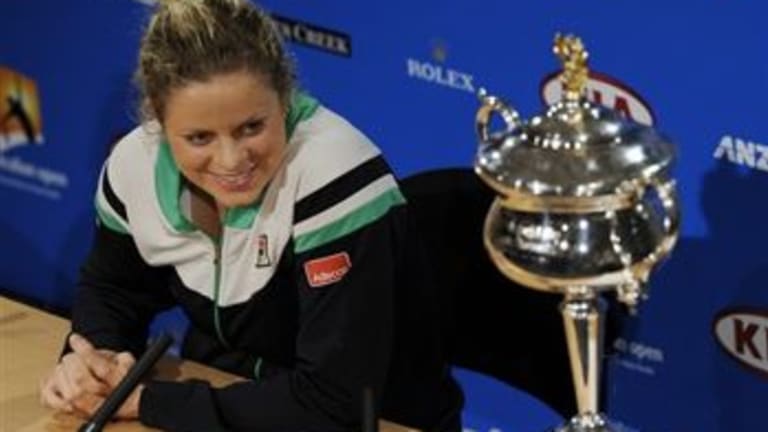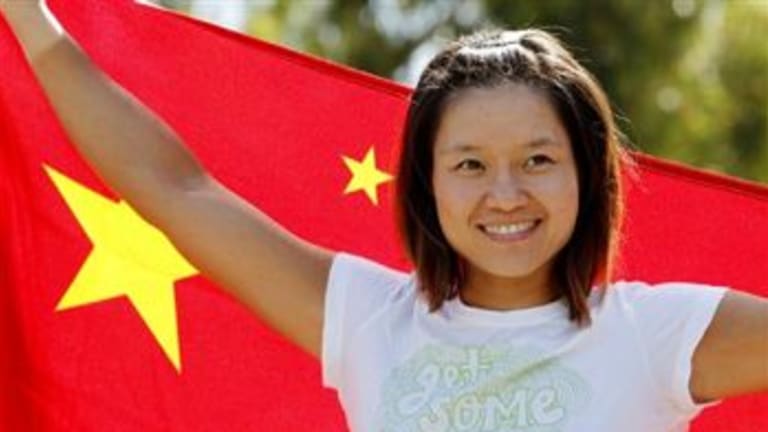What’s the current model for WTA success? If you want to reach a Slam final right now, you should be a hard-hitting married 28-year-old who grew up loving “Fraulein Forehand” Steffi Graf but whose best-looking stroke is a rolling two-handed backhand.
Does that sound like a (very geeky) personal ad? Kim Clijsters and Li Na found each other on Saturday night, and they turned out to be a good match. There was suspense, there were surprises, there were plenty of winners and plenty of running, there were ping-pong-style rallies and lots of digging, and there was a champion who, even at her advanced age, is still learning things about how to win. There were also 15 breaks of serve.
“She brought it to me from the beginning of rallies, right from the return,” Clijsters said, referring to Li’s early, walloping form. “I was getting backed up. I’m not used to that.”
There have been times, including against Nadia Petrova at the Aussie Open last year, when Clijsters might never have found her way out of that predicament. Her reaction to adversity has often been to play fast and pull the trigger fast and get off the court fast, which is usually a bad combination for her. And tonight Clijsters appeared ready to do that again. After winning the first eight points, she lost six of the next seven games.
Not only was she being outhit, she was losing the cat and mouse points as well. If both players are at the net, Clijsters has a knack for hitting the ball right back to her opponent, and giving the point away. Down 2-3 in the second set, she did this again, drilling what should have been an easy volley onto the strings of Li, who deflected it for a winner. I thought I had Kim figured out at last: “She has no killer instinct,” I said. “Deep down she wants to give those points to her opponent.” Clijsters had lost yet another deuce game just before that, her sixth of eight. She seemed doomed to defeat, an anxious and conflicted competitor yet again.
“I had to change things up,” she said. “I looped a few balls, I sliced a few. I could see that made her a little nervous.”
The change came at 2-3. Li let her off the hook and let her even the score. Clijsters took heart from how easy it was; she's experienced enough now to sense vulnerability. By the end of the set, it was the Belgian who was backing Li up. Instead of going after Li’s forehand, she had switched her attack to the backhand. She’d found a pattern that worked for her. By the beginning of the third, Clijsters was moving better than she had all night and swinging freely. Just as Li had against Caroline Wozniacki, Clijsters took this match. While Li got safer, Clijsters got bolder. She was more outwardly determined to claw her way through the third than I’d ever seen her.
Clijsters has now won two straight majors, and both times she did it by sticking it out in tough three-setters, against Venus Williams in New York and Li here. And just as she had in Flushing, she won going away tonight, holding at love to close it. Too bad, now that she’s learning to win the big ones even when she’s not at her best, she says she’s going to call it quits again next year.
Hearing Kim say that tonight was a drag, because at the same time she was being as charming and natural as ever. She said she had seen Alicia Molik before the match having a drink and thought, “Wow, I wish I could have one of those, but I have to go play.” She talked about how little things around the grounds remind her of her late father, flowers or sounds or anything she might see that jogs her memory of him; she says it happens dozens of times each day. Clijsters is very good and easy to relate to when she’s talking about the random workings of her mind.
She was best when she mentioned how much it meant for “Aussie Kim” to win in Australia. “I had so many supporters here that I felt bad that I couldn’t give something back and win a title.” (By the way, harking back to the Jim Courier interview story I wrote earlier in this tournament, the interview I’m citing wasn’t from the press room; it was from a conversation she had with Rennae Stubbs on Channel 7 after the match—ex-players get better stuff, no doubt about it.)
I enjoyed seeing Kim fill in this missing piece on her resume, but Li Na remained the story of the tournament. For me, it’s not because of what she did for Chinese tennis, which is a long, long, long term project anyway. Describing how big she was was in China at the moment, Li held her thumb and index finger half an inch apart; not as big as we think, apparently. Or maybe she was joking; it can be tough to tell.

